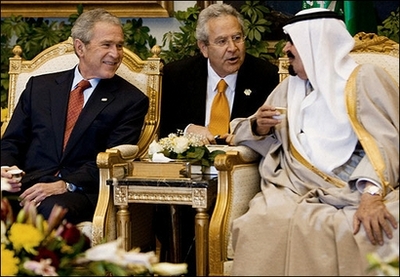Bush courts Saudi allies after warning Iran
Updated: 2008-01-15 07:11
RIYADH - US President George W. Bush began a visit to close ally Saudi Arabia on Monday to rally support from the regional economic and political powerhouse for his campaign to isolate archfoe Iran.
 President George W. Bush(L), seen here meeting with King Abdullah bin Abdul Aziz(R), began a visit to close ally Saudi Arabia on Monday to rally support from the regional economic and political powerhouse for his campaign to isolate archfoe Iran. [Agencies] |
The president's first visit to the kingdom was timed with a likely notification to Congress in Washington of a planned 20-billion-dollar arms deal with Gulf Arab states, with Saudi Arabia taking the lion's share.
Bush, on a tour of the region also aimed at fostering Middle East peace, warned in a keynote speech on Sunday in Abu Dhabi of what he called the threat to the world posed by Iran.
"The United States is strengthening our longstanding security commitments with our friends in the Gulf -- and rallying friends around the world to confront this danger before it is too late," he said.
Bush, who flew into Riyadh from Dubai and was embraced by King Abdullah at the airport, also charged that the Islamic republic was "today the world's leading state sponsor of terror".
The US leader landed just hours after French President Nicolas Sarkozy -- who has offered to share civilian nuclear technlogy with Muslim countries -- wrapped up a visit to Saudi Arabia, the world's biggest oil producer.
On Monday, Bush and Abdullah dined at the Riyadh palace which also serves as the king's residence. In accordance with the strict Islamic law in force in Saudi Arabia no alcohol was served but Bush is in any case now teetotal.
They will meet again on Tuesday at the monarch's ranch near the capital, before Bush visits Egypt on Wednesday to round off his week-long Middle East tour.
But diplomats said the US and Saudi leaders face "difficult talks" both on Iran and the Middle East conflict.
While Sunni-ruled Saudi Arabia has voiced concern over the rise of Shiite Iran, it is opposed to another war after the 2003 US-led invasion of Iraq that has strengthened the Islamic regime in Tehran.
Tensions between Washington and Tehran -- already high over Iran's controversial nuclear programme -- escalated shortly before Bush headed to the region over a confrontation in the strategic Strait of Hormuz between Iranian speedboats and US warships.
Israel also ratcheted up the rhetoric against Tehran over its nuclear drive on Monday, with Prime Minister Ehud Olmert warning: "We are not ruling out any option."
Iran lashed out at Bush's speech, saying regional ties would hold strong and the remarks smacked of desperation.
"The declarations of Bush show the desperation and sense of failure in the last months of his presidency," said foreign ministry spokesman Mohammad Ali Hosseini.
Saudi Arabia itself has called for restraint, with Foreign Minister Foreign Minister Prince Saud al-Faisal saying: "We are keen that harmony and peace should prevail among states of the region."
Iran and the international community have been at loggerheads for several years over its nuclear drive, which Washington suspects is a cover for ambitions to build atomic weapons -- a charge Tehran denies.
The continuing high oil price was also likely to be on the agenda of Bush's talks with the king having already featured in his talks with other Gulf oil producers.
"There has been discussions of oil and energy along with other issues that have come up in these talks," Bush counsellor Ed Gillespie told reporters.
"They talked about the nature of the market and the vast demand that's on the world market today for oil."
On the lucrative but sensitive arms front, the Bush administration unveiled its planned 20-billion-dollar deal with the Gulf last July. The notification kicks off a 30-day period during which Congress can raise objections.
The deal, which includes satellite-guided weaponry and high-tech munitions, has alarmed Israel and some US Congressmen, especially as Saudi Arabia refuses to recognise the Jewish state.
The administration, which has also announced a 30-billion-dollar military aid pact with Israel, argues the deal with the Saudis is needed to counter the perceived threat from Iran.
A senior US official said Bush will court Riyadh's diplomatic influence and financial muscle which "could make an enormous difference in places like the Palestinian territories, Lebanon, Iraq, Afghanistan and other locations."
Bush and Abdullah are also expected to discuss efforts to combat terrorism, with the US administration believing its ally -- the homeland of Al-Qaeda chief Osama bin Laden -- still has "more to do".
|
|
|
||
|
||
|
|
|
|